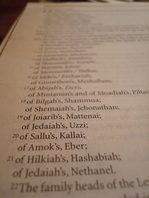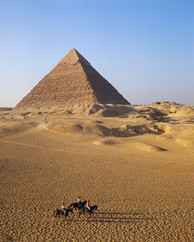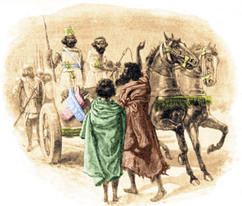 Jesus knew what His mission was and operated in such a way that nothing would interfere with that God given mission (John 2:4, 7:6-8). Throughout the gospel of John this mission is constantly referred to as the “hour” or “time” of Christ, that is “the determined time to act in an open disclosure of his messianic identity, which is climatically realized in his submission to death on a cross” (Howell, 37). Since Christ is fully aware that His time/mission is His death, resurrection, and ascension (John 13:1), He is fully sovereign, or in control over when (the hour) that death and departure happens (Elwell, 856), even miraculously able to escape angry mobs without harm (John 7:30, 8:20). Paradoxically, the “hour” of Christ's death on the cross is simultaneously His greatest humiliation and glorification (John 12:23, 27). “Jesus recognizes the culmination of all that he has been attempting in Judaism. The cross and death are all that remain” (Elwell, 865). The hour of tragedy becomes victory when all will hear His voice and be able to worship truly (John 4:21-23, 5:25, 28-29). Now the hour has passed, but Christ passed the mission on to His church; however, this “good news” of triumph over sin serves as bad news that will divide many, and true believers will be persecuted (John 16:2, 25, 32).
4 Comments
 “John would have prevented him, saying, 'I need to be baptized by you, and do you come to me?' But Jesus answered him, 'Let it be so now, for thus it is fitting for us to fulfill all righteousness.' Then he consented” (Matt 3:14-15). Many have questioned why Jesus was baptized, especially if John's baptism was one of repentance. For what would Jesus have to repent of if He was sinless? Some commentators point to the following verses where “the heavens were opened” for an answer, stating that when God declared “This is my beloved Son, with whom I am well pleased,” Jesus was publicly declared as God's son and marked the start of His ministry. Thus, it was by means of John's Baptism that Jesus was broadcast to the world to be the Son of God (a theme in Matthew's gospel), and hence Christ's words indicate baptism was a right that John and Jesus needed to fulfill (Sailhaimer, 438). While nothing is biblically wrong with this conclusion, it seems to be a veiled attempt to promote the authors theological view on baptism as a symbolic public declaration of faith (which I agree with). Sadly the commentators theological agenda (even for good theology!) overlooks the crucial significance of Christ's words and His baptism, which actually gives the symbolic act of baptism any meaning!  “And do not presume to say to yourselves, 'We have Abraham as our father,' for I tell you, God is able from these stones to raise up children for Abraham. Even now the axe is laid to the root of the trees. Every tree therefore that does not bear good fruit is cut down and thrown into the fire.” (Matt 3:9-10). The Pharisees and Sadducees were experts in the Law and genealogies (hence the importance of the genealogical introduction of Matthew's gospel). God's chosen people were the Jews and only the Jews who could trace their ancestry to Abraham (the Samaritans were ostracized for being unable to). The Jews understood that they were born into God's favor as part of the nation of Israel, and could only fall from that favor by failing to follow God's commandments in the Law of Moses. Thus, the Pharisees and Sadducees' sense of security was derived from their personal efforts in following the Law of Moses and national security since “We have Abraham as our father.” In a way, the religious leaders believed that for God to make good on His promises to Abraham He needed the nation of Israel and by extension those who kept the law of Moses.  “Now John was clothed with camel's hair and wore a leather belt around his waist and ate locusts and wild honey” (Mark 1:6 ). John the Baptist was a living anachronism, a prophet of old like Jeremiah (1:2) and Malachi (1:1) to whom the word of God came “shattering four hundred years of prophetic silence” (Howell, 25). In case the Jewish faithful missed it, John the Baptist's appearance would have matched the stories passed down from their ancestors regarding the appearance of God's prophets. He would have appeared most specifically like the prophet Elijah, who also wore a garment of camel hair and a leather belt (2 Kings 1:8) (interestingly, but irrelevantly some have posited that Elijah did not wear camel hair, but that Elijah himself was a really hairy man (Henry, 26). This additional parallel only reinforced the angel Gabriel's word that John would come “in the spirit and power of Elijah” (Luke 1:16-17) and fulfill the word of Malachi 3:1 and 4:5. Though John the Baptist denied it, all this significant evidence was not lost on the Jewish priests and Levites from Jerusalem who asked him “Who are you?...Are you Elijah?...Are you the Prophet?” (John 1:20-21).  “And he rose and took the child and his mother by night and departed to Egypt and remained there until the death of Herod. This was to fulfill what the Lord had spoken by the prophet, 'Out of Egypt I called my son'” (Matt. 2:14-15). Some commentators have drawn some bizarre applications of the infant Christ's time in Egypt ranging from our personal identification with Christ when our infants are in dire straights to God's justification for leaving the Jews because Egypt entertained Christ when they humiliated him during His infant years (Henry, 11). However, these applications take our focus off Christ and onto ourselves by forcing meanings onto the text that aren't there.  “'She will bear a son, and you shall call his name Jesus, for he will save his people from their sins.' All this took place to fulfill what the Lord had spoken by the prophet: 'Behold, the virgin shall conceive and bear a son, and they shall call his name Immanuel' (which means, God with us)” (Matt. 1:21-23). The famous “Sign of Immanuel” when delivered by the prophet Isaiah to King Ahaz of Judah occurred during the Syro-Ephraimite War. Tiglath-Pileser III of Assyria was rapidly expanding across the Ancient Near East when the leaders Rezin and Aram of the two small nations Syria and Israel (Ephraim) respectively joined forces to resist Assyrian amalgamation. Since Judah occupied the southern border of these two conspirator nations (and thus a potential 2nd front should Judah side with Assyria), they attempted to force King Ahaz to join their coalition against Tiglath-Pileser III.  The first thing John the Baptist's father Zechariah said once mouth was reopened was a Holy Spirit inspired prophesy about his son, calling him the prophet of the Most High. Praising God for promising mankind salvation through the line of David he recalls the promises of God for security (Jeremiah 23:3-8) through the establishment of God's rule (Isaiah 9:6-7). His paternal pride comes along the Spirit's inspiration as he dotes on his son's destiny to fulfill the words of Malachi 3:1 to prepare the way for the Lord, who will “give his people the knowledge of salvation through the forgiveness of sins” (Luke 1:77) to fulfill the words of Jeremiah 31:34b. Just like the angel Gabriel predicted, John is to bring the lost people back to their Lord “in the spirit and power of Elijah” (Malachi 4:6) “making 'them ready for the Christ” (Luke 1:15-17). When Jesus Christ arrives and begins His ministry He brings these prophesies to pass, so that those “living in darkness” indeed acknowledged Him because they were baptized by John (Luke 7:29-30). Thus, through John the Baptist, Christ appears as Zechariah prophesied and Isaiah prophesied (Isaiah 9:1-2), “a rising sun from heaven will shine in the darkness and in the shadow of death” guiding us by His teachings and onto the path of peace through His ultimate work on the cross.  Philippe de Champaigne When the chosen mothers, Elizabeth mother of John the Baptist, and Mary mother of Jesus Christ, the ministry of John the Baptist begins, even without being born. Both mothers are filled with the Holy Spirit after John leaps in womb with Elizabeth exclaiming that Mary will be the mother of “my Lord” and pronounces a blessing on Mary. Mary in turn sings a song for joy (Mary's Magnificat) inspired by the prophesied miraculous birth. However, contrary to normal expectations, “for only in verse 48 does Mary dwell on the personal benefits of being the mother of the Lord” (Elwell, 806), a lowly handmaiden from Nazareth, the instrument of unending blessing for the coming generations (Howell, 9). |
AuthorBrett Yardley: Categories
All
Archives
January 2019
|


